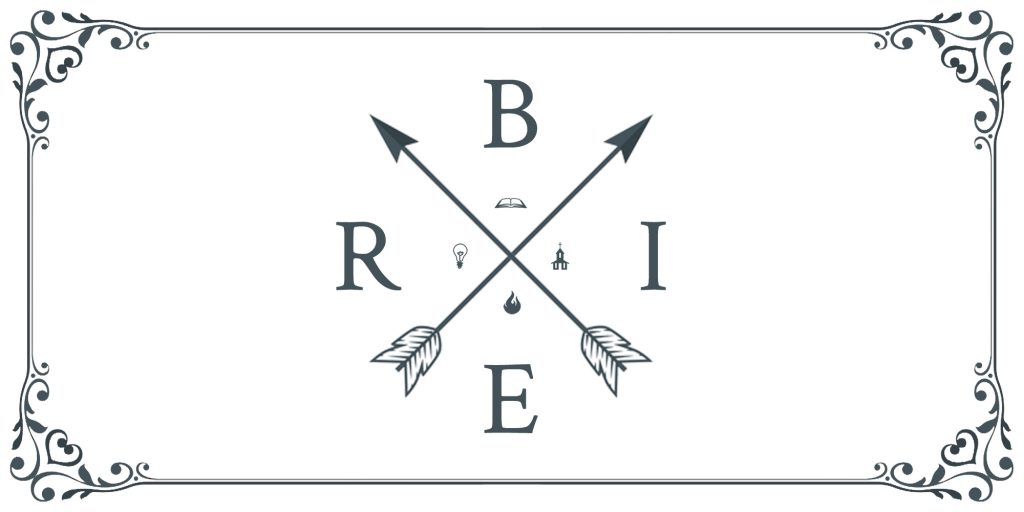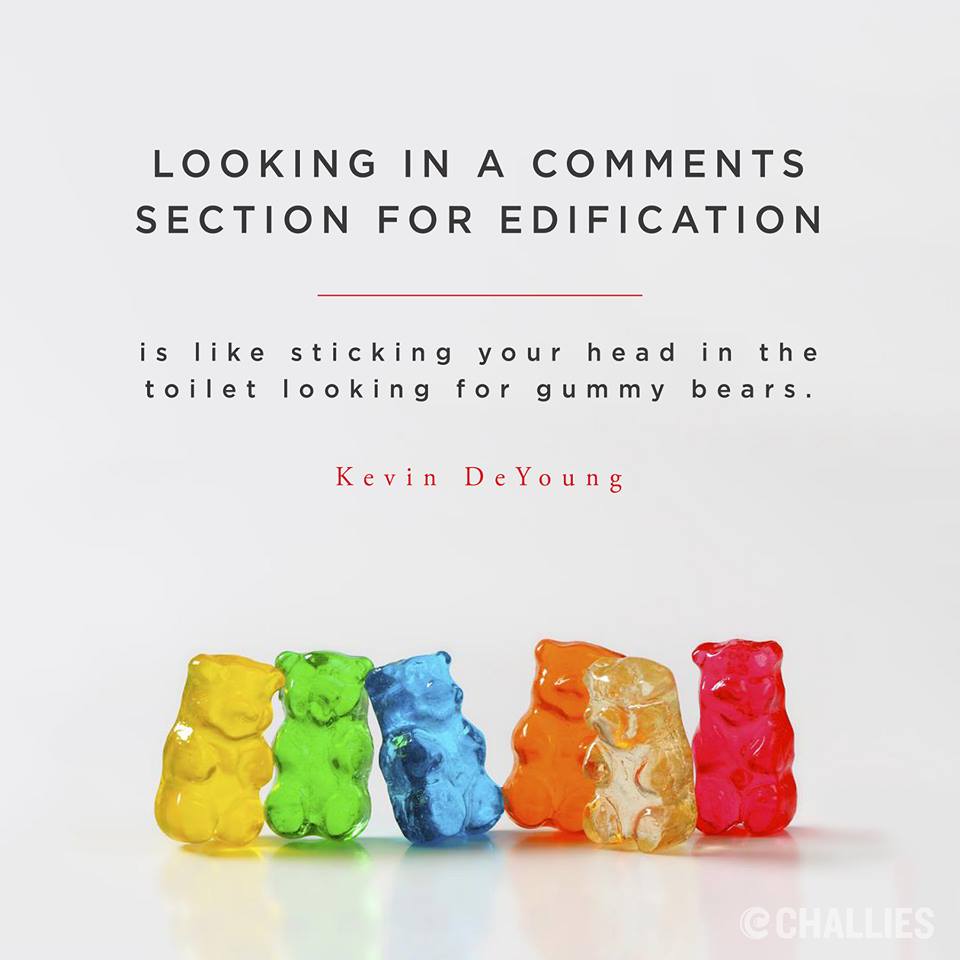Subtle Christian Traits and all those comments
Subtle Christian Traits. I joined the group I think when it numbered a few thousand. The posts were witty and funny, and while some memes/posts had a small sting they were ‘loving’ jabs – the wounds of a faithful friend (cf Proverbs 27:6).
But as the group got larger the posts began to stray from the original intent of the group (“Our aim with this group was of course humour, but also embrace our not-so-subtle traits of edifying one another as brothers and sisters in Christ!”). A number of posts appearing with more pointed theological jabs, a couple of heretical posts (!), and a few really unfunny weird flex memes. Is that a bad thing? Well, I’m not the moderator or admin of the group, so I don’t have that strong of an opinion on the evolution of the group. In some ways, it was expected – the larger the group got the wider the umbrella would have to become to accommodate anyone claiming to be ‘Christian’. So this didn’t bother me.
What bothered me more were the comments section. Kevin DeYoung said it best:
Heaps of opinions and debates – and most concerning: heaps of opinions that appeared to be based on faulty foundations.
This is partly why I don’t engage much in comments or debates online anymore – despite the sometimes overwhelming temptation. I’ve personally found Facebook, and the comments section in general, to be such a bad forum for debates. Taking conversations offline, meeting someone in person – face to face, imagine that! – and thrashing out our differences with our Bibles open has been much more fruitful.
This differs from comments on my own personal wall/posts. Those I’ll generally engage with and interact with – you are my friends after all! But in public groups such as Subtle Christian Traits, and on other sites like Relevant of The Gospel Coalition, I personally feel the comments section are a bit of a waste of time.
But I know that some of my readers are often in the comments engaging with others – good on you. It’s not for me, but more power to you. For these friends, I’d like to give some encouragement on how to engage and how to think through why others engage the way they do. (This post is mostly sparked by a comment debate I’ve seen one friend get into with a stranger where I’ve realised my friend just didn’t seem to connect or understand where the stranger – a fellow Christian – was coming from).
So you’re in the comment section, you’re engaging with someone and sharing your thoughts, and they respond in a way that surprises you. You might be wondering why some Christians hold their positions so strongly. I’ve seen some comment debates derail before they even begin – and all for the same reason: Christians leaning on different authorities.
BRIE and Authority
In matters of faith and spirituality, we all lean on an authority to shape and form our opinions. The question is what authority are you leaning on?
Here’s where the acronym, ‘BRIE’ can be a helpful compass to orient where you might be in any given conversation.
BRIE stands for Bible (the Word of God), Reason (logic, arguments, human reasoning), Institutions (such as the Church, traditions, and history), and Experience (our feelings, emotions, and experiences in general).
When it comes to authority in our faith there can be a tendency to elevate one over the others in the position of supreme governing authority – and in turn that shapes how you view your faith and the world around you.
Elevating reason to first place is the tendency of liberal Christianity – where arguments and human reasoning have been used to argue against central doctrines like the resurrection and the trustworthiness of Scripture. The arguments have generally relied on things like science disproving miracles, or arguments of historical reconstructions to explain away parts of the Bible. But the main thing about this is that the Bible is filtered through the lens of reason, and when the two seem to conflict, human reasoning takes precedence.
Elevating institutions to first place is the tendency of Roman Catholicism and Orthodox Christianity – where the traditions and history of the church have been used as the primary filter for interpreting the Bible. Start with a particular tradition or historical view and read the Bible through that lens. One example I’ve read of this is to find support for the Roman Catholic doctrine of purgatory within the parable of the unforgiving servant (cf Matthew 18:34 where the master delivers the unforgiving servant over to the jailers ‘until he should pay all his debt’).
Elevating experience to first place is the tendency of charismatic influenced Christianity – where your experiences are relied upon and given authority, even if scripture says something different. Experiences are used as examples for other Christians to follow. Which isn’t necessarily a bad thing, but when experiences are authoritative, and alone form the foundation of wisdom and advice, then we run into problems. Experience becomes the lens by which we filter scripture. To give a somewhat controversial example: some argue that women can be pastors and preach to mixed congregations on the basis that they have experienced fruitful/helpful teaching from women pastors in the past.
By now, it should be clear that I intend to argue that we should elevate scripture to first place. But I want to be clear that in doing so I do not deny the use or truthfulness of reason, institutions, or experience. But I am arguing that whatever use or truth there might be must first be examined in the light of scripture’s governing authority. If my reasoning conflicts with scripture on matters of faith, then I must humbly submit the conflict to scripture and persevere in working it through (as opposed to just rejecting scripture in favour of human reason). If the institution or tradition conflicts with scripture, then I must reform the institution or tradition in the light of scripture. And I must understand my experience in the light of scripture as well – ensuring that the practice of faith is not dependent on an experiential moment alone.
Here are five reasons I think that on matters of faith and spirituality scripture should have supreme authority.
- Jesus prioritised the Word in his ministry. When he fended off Satan’s attacks in the wilderness (Matthew 4:1-11), corrected the Pharisees’ misapplication of the Sabbath (Matthew 12:1-5) and traditions surrounding cleanliness (Mark 7:1-13), or pointed to what framed the purpose of his ministry (e.g. Luke 18:31, 22:37) Jesus put God’s Word front and centre. Scripture drove, shaped, and was the basis of his ministry.
- The Apostles prioritised the Word. When Peter explained the meaning of the apostles speaking in tongues, announcing the coming of God’s Kingdom with the death and resurrection of Jesus, his Pentecost sermon was saturated in scripture (Acts 2). When the Apostles later heard of the conversion of the Gentiles and the Holy Spirit descending upon them, they turned to Scripture to inform their understanding of these events (Acts 15:1-18). Scripture was used to filter these experiences.
- Paul used scripture to reason for the gospel. In the towering letter of Romans he reasons clearly that our perfect standing before God, our righteousness, is received by faith alone. In order to make this point (cf Romans 4:1-12) he refers to Abraham’s story in Genesis and quotes David from Psalm 32. Paul doesn’t use reasoning alone, but his reasoning is rooted in and shaped by Scripture.
- Paul would later declare that because ‘All scripture is God-breathed’ it made it perfect and sufficient for all our spiritual needs (cf 2 Timothy 3:14-16). The scripture being referred to here is the Old Testament, but as the Apostles wrote and affirmed each other’s writings as scripture (cf Peter’s equating of Paul’s writings as scripture in 2 Peter 3:15-16, and Paul’s quoting of Luke in 1 Timothy 5:18), and as the New Testament gospels and letters were affirmed and then canonised, it wasn’t inappropriate for the Church to then affirm Paul’s words in 2 Timothy as referring to all of scripture – the Old and New Testament.
- The church, during the Protestant Reformation, returned to prioritising scripture as the ultimate authority. It is a distinctive hallmark of reformed theology that the Bible rises above other forms of authority and is also constantly reforming our faith (in regards to our knowledge and practice), which is why the reformation movements kept returning to the Bible and asking, ‘What does scripture say on this subject?’ in order to work out the biblical fidelity of any doctrine or practice.
That’s five good reasons, I think, why scripture should be our chief authority in matters of faith and conduct. It makes further sense as well given that the other three aspects of authority are prone to change – institutions/traditions are always changing, reason and arguments are ever-evolving, and our experiences wax and wane constantly. In the middle of all that is the Bible – ever constant and unchanging. Yes it’s hard work to get to that unchanging message, but hard work should not stop us from keeping it at the centre and making it the first authority.
So what?
So what does this have to do with Facebook comments?
First, for my friends who engage themselves in online debate – knowing a bit about BRIE might help you work out why someone argues for their position. It helps us reflect and perhaps ask gentle questions about their position in more pointed, and prayerfully helpful ways.
Second, it helps us listen. Knowing which BRIE authority someone is elevating helps us to listen to why they lean on their position. In listening and understanding, can we then engage with what scripture has to say. I don’t think I’ve read or heard any Christian deny the authority of scripture over their lives – but perhaps they haven’t realised how much scripture speaks on a particular issue or train of thought. Perhaps they haven’t realised how much they rely on other sources of authority.
Third, it can help you work out when to call it quits. I had a short-lived debate with someone online once where I quickly discovered that his theological foundation was not only weirdly charismatic (emphasis on weirdly – even my charismatic friends would have found his position on things untenable) but he couldn’t and wouldn’t engage with the scriptural arguments I was putting forth. He began talking past my replies – not engaging with them at all – and at that point I realised it was fruitless to continue. I would have offered to meet up for coffee, but he lived overseas and I figured I didn’t have pastoral responsibility over him. So I pulled the plug.
So there you go. I hope that introduction was helpful. In what ways have you seen BRIE in action? Do you think there are other sources of authority I haven’t considered? Let me know in the comments below.



Comments are closed